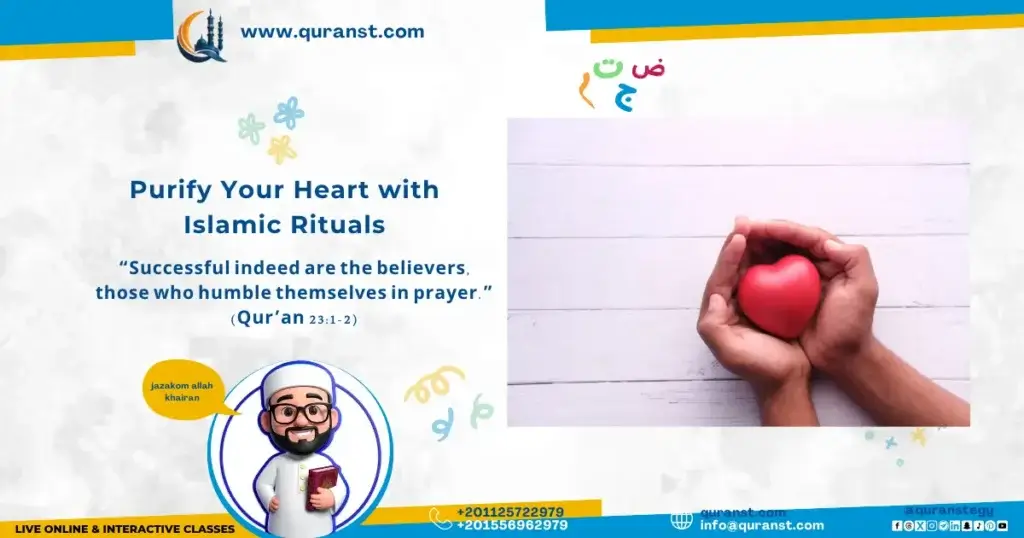The Rituals of Islam and Their Transformative Impact on Hearts and Consciences
Introduction
Islamic rituals are not mere outward practices or hollow rites; they are a comprehensive spiritual system that aims to purify the soul, cleanse the wealth, and bind the servant to his Lord. Prayer, zakat, fasting, pilgrimage, remembrance, and recitation of the Qur’an—each of these is a fortress that elevates the spirit and polishes the heart.
The Qur’an declares:
﴿قَدْ أَفْلَحَ الْمُؤْمِنُونَ * الَّذِينَ هُمْ فِي صَلَاتِهِمْ خَاشِعُونَ﴾ (المؤمنون: 1-2)
“Successful indeed are the believers, those who humble themselves in prayer.” (Qur’an 23:1-2)
Classical scholars often reflected upon how these acts of worship refine the heart and awaken the conscience, forging a deep link between man and his Creator.
The Impact of Prayer on Refining the Self and Connecting with God
Prayer (ṣalāh) is the pillar of religion, the direct link between the servant and his Lord. In standing before Allah with humility and focus, worldly concerns fade and the soul finds serenity.
Ibn al-Qayyim said:
«إنما تكفر الصلاة سيئات من أدى حقها وأكمل خشوعها ووقف بين يدي الله تعالى بقلبه»
“Prayer only expiates sins for those who fulfill its rights, complete its humility, and stand before Allah with their hearts.” (Ibn al-Qayyim, Al-Wābil al-Ṣayyib)
The Prophet ﷺ said:
«من توضأ فأحسن الوضوء خرجت خطاياه من جسده» (صحيح مسلم)
“When a person performs ablution and perfects it, his sins depart from his body.” (Ṣaḥīḥ Muslim)
Thus, prayer does not merely regulate time and posture, but purifies the soul, disciplines the self, and nourishes the conscience.
The Impact of Zakat on Purifying Wealth and the Heart from Greed
Zakat is not a tax—it is a spiritual purification for both wealth and soul. The Qur’an states:
﴿خُذْ مِنْ أَمْوَالِهِمْ صَدَقَةً تُطَهِّرُهُمْ وَتُزَكِّيهِمْ بِهَا﴾ (التوبة: 103)
“Take from their wealth a charity by which you purify them and cause them increase.” (Qur’an 9:103)
Ibn Rajab al-Ḥanbalī commented:
«الزكاة تطهر المال وتنميه، وتطهر نفس صاحبها من أدران الشرك والبخل…»
“Zakat purifies wealth and increases it, and purifies the soul of its owner from the filth of shirk and miserliness.” (Ibn Rajab, Jāmi‘ al-‘Ulūm wa-l-Ḥikam)
The Qur’an further promises:
﴿وَمَا أَنفَقْتُمْ مِن شَيْءٍ فَهُوَ يُخْلِفُهُ وَهُوَ خَيْرُ الرَّازِقِينَ﴾ (سبأ: 39)
“Whatever you spend, He will replace it; and He is the best of providers.” (Qur’an 34:39)
Zakat cleanses hearts from greed, strengthens social bonds, and cultivates a purified conscience that finds joy in giving.
The Impact of Fasting on Training the Conscience and Breaking Desires
Fasting is not simply abstention from food and drink, but a school of self-discipline and God-consciousness. Allah says:
﴿يَا أَيُّهَا الَّذِينَ آمَنُوا كُتِبَ عَلَيْكُمُ الصِّيَامُ… لَعَلَّكُمْ تَتَّقُونَ﴾ (البقرة: 183)
“O you who believe, fasting has been prescribed for you… so that you may attain taqwa (God-consciousness).” (Qur’an 2:183)
The Prophet ﷺ said:
«الصيام جنة» (صحيح البخاري)
“Fasting is a shield.” (Ṣaḥīḥ al-Bukhārī)
Imam al-Ghazālī wrote:
«صوم العموم كف البطن والفرج عن الشهوة… وصوم القلب عن الهمم الدنية…»
“The fasting of the common is to restrain the stomach and private parts; the fasting of the elite is to restrain the senses; and the fasting of the elite of the elite is to restrain the heart from lowly desires.” (Iḥyā’ ‘Ulūm al-Dīn, vol. 1)
Through fasting, the believer learns self-restraint, awakens his conscience, and strengthens his willpower to resist sinful urges.
The Impact of Hajj on Renewing the Covenant and Uniting the Ummah
Hajj is the greatest spiritual journey, a renewal of the covenant with Allah and a profound manifestation of Muslim unity. The Qur’an says:
﴿وَأَذِّنْ فِي النَّاسِ بِالْحَجِّ يَأْتُوكَ رِجَالًا وَعَلَىٰ كُلِّ ضَامِرٍ يَأْتِينَ مِن كُلِّ فَجٍّ عَمِيقٍ﴾ (الحج: 27)
“And proclaim to the people the pilgrimage; they will come to you on foot and on every lean camel; they will come from every distant path.” (Qur’an 22:27)
The Prophet ﷺ said:
«الْحَجُّ الْمَبْرُورُ لَيْسَ لَهُ جَزَاءٌ إِلَّا الْجَنَّةُ» (صحيح البخاري)
“An accepted Hajj has no reward except Paradise.” (Ṣaḥīḥ al-Bukhārī)
In the sacred rites of Hajj, Muslims shed differences of race, wealth, and status, and stand together in a single act of devotion, chanting: “Labbayka Allahumma Labbayk”—“Here I am, O Allah, at Your service.”
The Impact of Dhikr and Qur’an Recitation on Illuminating the Heart and Strengthening Faith
Dhikr and Qur’an recitation are the lifeline of the believer’s heart. Allah says:
﴿الَّذِينَ آمَنُوا وَتَطْمَئِنُّ قُلُوبُهُم بِذِكْرِ اللَّهِ ۗ أَلَا بِذِكْرِ اللَّهِ تَطْمَئِنُّ الْقُلُوبُ﴾ (الرعد: 28)
“Those who believe and whose hearts find tranquility in the remembrance of Allah—indeed, in the remembrance of Allah hearts find rest.” (Qur’an 13:28)
Imam al-Qushayrī wrote:
«الذكر منشور الولاية ومنار الوصلة… فليس وراء الذكر شيء»
“Remembrance is the banner of sainthood, the lighthouse of connection… there is nothing beyond dhikr.” (Al-Risālah al-Qushayriyyah)
The Prophet ﷺ said:
«خيركم من تعلم القرآن وعلمه» (صحيح البخاري)
“The best among you are those who learn the Qur’an and teach it.” (Ṣaḥīḥ al-Bukhārī)
Thus, dhikr and Qur’an recitation illuminate the heart, anchor faith, and grant the believer inner peace and spiritual resilience.
The Interconnected System of Worship: A Complete Path to Purification
When combined, these rituals form a holistic spiritual system: prayer instills humility, zakat purifies wealth, fasting disciplines desires, Hajj renews covenant and unity, while dhikr and Qur’an sustain the soul with constant light.
Ibn al-Qayyim remarked:
«القلب يصدأ… وجلاؤه بالذكر»
“The heart rusts… and its polish is remembrance.” (Al-Wābil al-Ṣayyib)
Together, these acts of worship polish the heart, awaken the conscience, and prepare the believer to live as a true servant of Allah—both inwardly and outwardly.
Conclusion
Islamic rituals are not burdens but gifts—pathways to purification, serenity, and closeness to Allah. Whoever embraces them sincerely discovers the sweetness of faith and the tranquility of conscience.
Let our prayers, fasts, charities, pilgrimages, and remembrances be performed with sincerity, so that our hearts may be illuminated, our wealth purified, and our souls uplifted.


